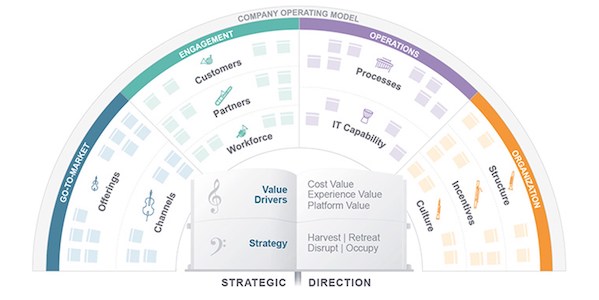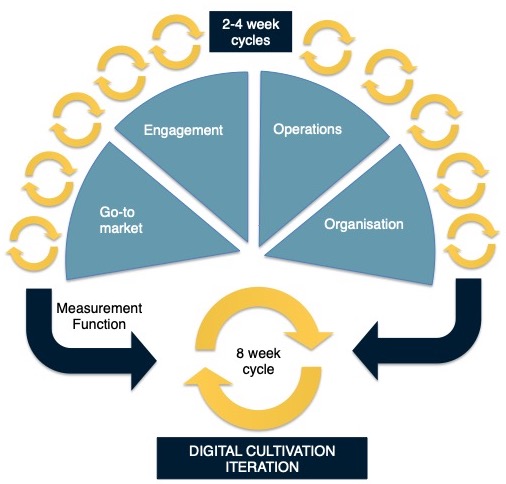Digital Cultivation
Modpod’s approach is all about cultivating digital capability in an organisation’s people, processes and technology. Our services span various digital disciplines, with a heavy focus on aligning our clients’ digital strategy with a data and growth infrastructure that allows for rapid learning cycles. At a basic level, this might mean setting up product analytics, getting data flowing between tools or driving smarter email automation. But increasingly these types of initiatives need a broader strategy and processes that streamline data and learning across team workflows, product development and sales and marketing engagement.
Modpod’s principles of Digital Cultivation are simple. They map to 3 core issues we have uncovered and believe define the success of digitisation projects: Scope-creep, non-review and non-enablement. You’ve likely heard a version of the below principles repeated over and over in innovation contexts. But they have been forgotten in the world of growth and digital strategy.
ITERATE
Iteration and experimentation should produce rapid learning cycles. Without the right tools, data, and processes, your team is unable to execute fast and build organisational intelligence on what works and what doesn’t.
MEASURE
Data is essential for agility in uncertain environments. It also happens to be at the centre of today’s disruption across industries. Enabling people, processes and technology to be more data-driven unlocks efficiency gains.
PROPEL
Gone are the days of one-off campaign delivery. Digital projects should enable entrepreneurial spirit from within. Provide the system and tools for your team to find more efficient ways of working and new value streams.
These principles can be applied across organisational capabilities. The IMD Digital Orchestra model allows us to break down how Modpod manifests Digital Cultivation across the organisation.

Go-to-market strategy – This is gamut of the standard digital agency, leading clients to data-driven iteration and improvement in their product (UX, funnel optimisation, retention, referral) and marketing (omnichannel automation, growth infrastructure, performance marketing analytics).
Engagement – Lean methods are also commonly applied in improving engagement with customers and partners through CRM and marketing software providing better data consolidation and experimentation possibilities. Increasingly this is also the case in recruitment and employee engagement software. Modpod helps clients apply the same principles of experimentation and measurement through these systems.
Operations – Modpod’s digital consulting is increasingly built into an organisation’s ways of working. That means cultivating capabilities for the organisation rather than delivering final products or campaigns. Establishing internal processes and the technical infrastructure (especially data consolidation, dashboards, KPI setting) for measurement and experimentation is essential in these cases.
Organisation – Often recognised as the most difficult place to institute change. This entails changing the structure and incentives for experimentation, failure, and focus on measurement and improvement. Modpod works closely with clients to understand their team and culture, and build a system and training that empowers entrepreneurship.
The Roadmap
It is real experiments and methods that connect each orchestra section to the 3 cultivation principles. In the Go-To-Market section that could be growth marketing methodology focusing on the acquisition and retention funnel. In the Engagement section it could be Design Thinking activities to better understand and serve the needs of customers. Many small projects and tools are at our disposal. This is “start small, think big” in the transformation process itself. We work with clients to define needs and identify areas in the digital orchestra where we can start to iterate, measure, and propel. Structured feedback loops help us progress openly, learning from failures and propelling successes.

How to Measure
In order to connect activities back to learning outcomes in each section of the digital orchestra, there is a measurement function that acts as a common language for assessing progress. Establishing that measurement function and systems for acting on the measurement is the tangible offering in much of Modpod’s work. For example, establishing the KPIs for website conversion growth, the tracking mechanism for understanding the different aspects of conversion, and an experimental structure for improving conversion through product or marketing changes. However, the substantive offering is a system that cultivates continuous innovation, since it is not just measuring the conversion rate, but also continuously improving in the experimental structure and processes. Some questions we ask to evaluate:
- How many experiments have been conducted?
- What have we learnt?
- How do we know?
- Which kinds of experiments, in which orchestra sections have the best outcomes?
Measurement cycles fuel individual digital projects to improve, at the same time as fuelling improvement in the way we execute those projects. In our experience, project cycles should be kept to 2-4 weeks, and cultivation review cycles at 8 weeks (in line with research).
Digital Cultivation is a new paradigm for considering how organisations can navigate the fast-rate at which machine automation, platform ecosystems and crowd-sourced value disrupt industries. It is a philosophy for tooling an organisation with the systems that allow their organisation to explore transformative experiments every day. It is a guiding philosophy because ideally the methods for iterating, measuring and propelling reinvent themselves in response to learning.
Get in touch with Modpod to discuss how Digital Cultivation can work for your organisation.

